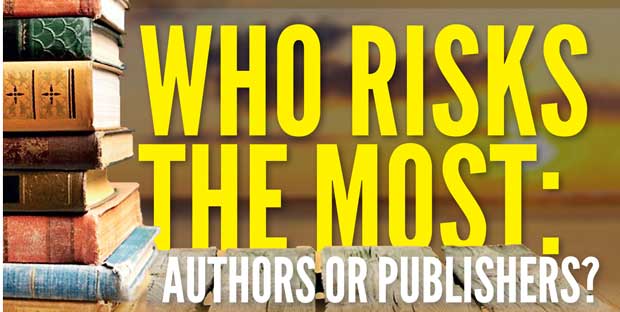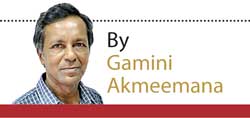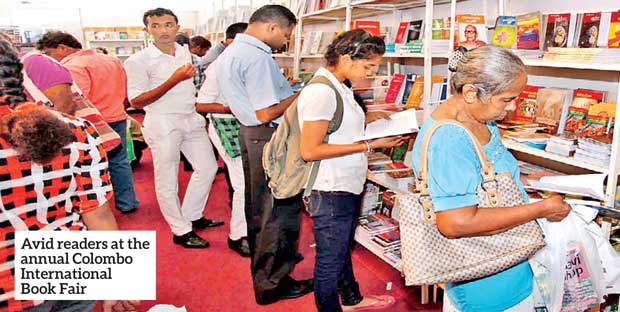Reply To:
Name - Reply Comment
Last Updated : 2024-05-10 19:01:00

 While Sri Lankan authors have always had a tough time with their publishers, their counterparts in the UK and the US too face hardships, though for different reasons altogether.
While Sri Lankan authors have always had a tough time with their publishers, their counterparts in the UK and the US too face hardships, though for different reasons altogether.
In an open letter to Britain’s publishers, the Society of Authors said a recent survey found that the median income of a professional author stands at 11,000 pounds today. It added that only a mere 11.5% of British writers make a living by writing only. Many others engage in various other jobs. Some established writers even seek financial assistance.
It is a daunting landscape, far more savage and hostile to the author than any we have seen before
In the US, the Authors Guild said the median income for members has plummeted 24% in five years as a result of piracy, Amazon and publishers’ cost-cutting. The median income for an American author in 2014 was $8,000. Some 56 per cent of American writers declared they earned less than the $11,670 estimated in 2014 to have been the minimum income needed by a one-person American household. Philip Pullman, author of the bestselling ‘His Dark Materials’ and UK Authors Guild President, declared bluntly: “From our positions as individual creators, whether of fiction or non-fiction, we see a landscape occupied by several large interests, some of them amassing profits in billions, some displaying a questionable attitude to paying tax and some others colonising the internet with projects whose reach is limitless and attitude to creators’ rights roughly that of the steamroller to the ant.
“It is a daunting landscape, far more savage and hostile to the author than any we have seen before. But one thing hasn’t changed, which is ignored, unacknowledged but complete dependence of those great interests on us and on our talents and the work we do in the quiet of our solitude. They have enormous financial and political clout, but no creative power whatsoever. Whether we are poets, historians, writers of cookery books, novelists or travel writers, we originate the material they exploit.”
Several Gratiaen winners have told this writer how they must do the rounds of various Colombo bookshops to collect money summing to a few thousand rupees
The society would like authors to receive at least 50 per cent of e-book revenue, rather than half, 25 per cent. They ask publishers not to discriminate the writers who are deprived of powerful agents.
The Authors Guild letter added: “Some publishers are excellent, but we see many inequitable contracts. Without serious contract reforms, the professional author will become an endangered species and the publishers – as well as the society at large – will be left with less and less quality content. Unless publishers treat their authors more equitably, the decline in the number of full-time writers could have serious implications for the girth breadth and quality of content that drives economic success and cultural reputation of our creative industries in the UK.”
Daniel Hahn, author, translator and chair of the society’s management committee said: “I understand the book business isn’t easy for anyone right now – well, nearly anybody – and that plenty of good publishers are struggling too. But today, we’ve reached a point where the professional author is under serious threat, and that’s not a state of affairs that is good for any of us – not for publishers, not for writers, and certainly not for readers and the wider culture. We must not allow ourselves to drift into a situation where only the already-wealthy can afford to be writers, and so it’s time to re-balance the scales a little.”
In the US, the publishing industry claims dominance by Amazon has forced it into a corner. US Authors Guild Executive Director Mary Rasenberger said: “First, we have an unhealthy marketplace for books because of Amazon’s dominance of the US book market. Thousands of bookstores have closed as are unable to compete with Amazon. Many readers can only find books they want through Amazon… the ‘pure click’ business has forced publishers to accept terms it dictates, often unhealthy. Realising that a publisher cannot survive without Amazon in today’s world, the business capitalises by forcing them to accept unfair terms and conditions. The publishers then pass on the losses incurred as a result of Amazon’s tactics to its authors.”
She went on to add that there was no rational justification, however, for publishers to give a 25% royalty to e-books, when they cost much less to produce than the traditional print version. The US Authors Guild, backed by a group of high-profile authors headed by Douglas Preston, has called on the US Justice Department to investigate Amazon.
Richard Mollet, Chief Executive of the UK Publishers Association, said while publishers share the frustration of the author community that it is increasingly difficult for them to make a decent living, the principal source of this problem lies not in contractual relations between the publisher and author in deeper market factors.
In an increasingly polarised Western book market, the top ten per cent of authors took 58 per cent of all earning made by professional authors in 2013. The top five per cent who make more than 100,000 pounds a year took 42.3 per cent of all earnings.
A record number of UK authors have applied for emergency financial assistance. The Society’s Chief Executive Nicola Solomon said: “There are more worthy applicants. These are people whom you might call ‘proper writers,’ who have made a living out of writing in their entire career. They are not people who once wrote a poem. It is depressing to see the dilemma they are trapped in.”
“Publishers are less willing to take risks, focusing on series and writers who have become brands, so the midlist is suffering terribly,” Solomon added, “People who could get a decent advance for a book that would earn steady sales aren’t getting the support they used to, they are being dropped after one or two titles.”

This spells big trouble for writers who are approaching the end of their careers as many publishers do not want to let authors assume control when books go out of print. Solomon says: “Publishers are demanding all the rights and then hanging on to them, fearing that some new platform for exploiting them is just around the corner.”
In Sri Lanka, the relationship between authors and publishers has never been clear-cut. Royalties are unheard of, and ‘advances’ for books are usually given on the basis of personal preferences. An author who has an established, long-term association with a big name publisher may ask for an advance in case of a wedding or similar personal matter. Then, he or she will write a book to pay off that advance, which in fact is a loan. Publishers are usually miserly in their payments made on the basis of sales. Several Gratiaen winners have told this writer how they must do the rounds of various Colombo bookshops to collect money summing to a few thousand rupees, the equivalent of a grocery bill.
Some writers, especially in the Sinhala medium, make astonishing claims about book sales and how much they make. They remain to be verified. Those who find the means resort to self-publishing. Some, including a few poets, have successfully used the public domain, facebook, as a sales interface. As yet, Sri Lankan writers face no big threat from the internet. The biggest danger is presented by publishers, who are generally unprofessional and often unscrupulous.

Add comment
Comments will be edited (grammar, spelling and slang) and authorized at the discretion of Daily Mirror online. The website also has the right not to publish selected comments.
Reply To:
Name - Reply Comment
US authorities are currently reviewing the manifest of every cargo aboard MV
On March 26, a couple arriving from Thailand was arrested with 88 live animal
According to villagers from Naula-Moragolla out of 105 families 80 can afford
Is the situation in Sri Lanka so grim that locals harbour hope that they coul
10 May 2024
10 May 2024

37 minute ago
09 May 2024
09 May 2024